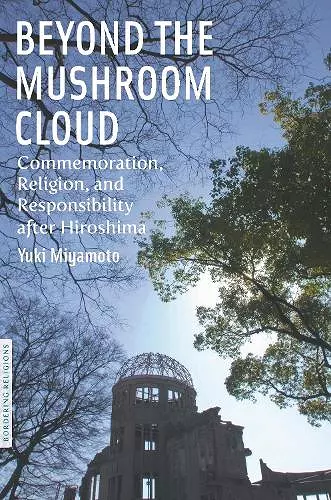Beyond the Mushroom Cloud
Commemoration, Religion, and Responsibility after Hiroshima
Format:Paperback
Publisher:Fordham University Press
Published:2nd Dec '11
Currently unavailable, and unfortunately no date known when it will be back

This monograph explores the ethics and religious sensibilities of a group of the hibakusha (survivors) of 1945’s atomic bombings. Unfortunately, their ethic of “not retaliation, but reconciliation” has not been widely recognized, perhaps obscured by the mushroom cloud—symbol of American weaponry, victory, and scientific achievement. However, it is worth examining the habakushas’ philosophy, supported by their religious sensibilities, as it offers resources to reconcile contested issues of public memories in our contemporary world, especially in the post 9-11 era. Their determination not to let anyone further suffer from nuclear weaponry, coupled with critical self-reflection, does not encourage the imputation of responsibility for dropping the bombs; rather, hibakusha often consider themselves “sinners” (as with the Catholics in Nagasaki; or bonbu—unenlightened persons in the context of True Pure Land Buddhism in Hiroshima). For example, Nagai Takashi in Nagasaki’s Catholic community wrote, “How noble, how splendid was that holocaust of August 9, when flames soared up from the cathedral, dispelling the darkness of war and bringing the light of peace!” He even urges that we “give thanks that Nagasaki was chosen for the sacrifice.” Meanwhile, Koji Shigenobu, a True Pure Land priest, says that the atomic bombing was the result of errors on the part of the Hiroshima citizens, the Japanese people, and the whole of human kind. Based on the idea of acknowledging one’s own fault, or more broadly one’s sinful nature, the hibakusha’s’ ethic provides a step toward reconciliation, and challenges the foundation of ethics by obscuring the dichotomyies of right and the wrong, forgiver and forgiven, victim and victimizer.
To this end, the methodology Miyamoto employs is moral hermeneutics, interpreting testimonies, public speeches, and films as texts, with interlocutors such as Avishai Margalit (philosopher), Sueki Fumihiko (Buddhist philosopher), Nagai Takashi (lay Catholic thinker), and Shinran (the founder of True Pure Land Buddhism).
"This imaginative and deeply thoughtful book explores a rarely asked question: How does being victimized challenge individuals ethically? Miyamoto explores the ethical and religious resources that Japanese atomic-bomb victims (hibakusha) have deployed to make sense of their experiences and guide their efforts to live good lives after surviving such a shattering event." -- -Laura Hein Northwestern University "Religious studies professor Miyamoto presents a thoughtful, scholarly examination of how the Japanese people remember and memorialize the terrible loss of human life in the atomic bombings of August 1945 and addresses the question of how the horror of the atom bomb should be remembered." -Choice "An extremely important exploration of modern Japan and the role of postwar Japanese thought and religiosity seen in a global setting." -- -Steven Heine Director of the Institute for Asian Studies, Florida International University "This book promises to generate substantive conversations about how to formulate genuinely self-critical ethical dispositions that remember Japan's horrific past as a means of moving beyond conflicts in the present, and its expansive reach across regional and disciplinary boundaries serves as a model for imaginative research." -- -Levi McLaughlin Journal of Japanese Studies "...a thoughtful and scholarly examination of how the Japanese populace remembers and memorializes the loss of so many of its citizens from the 1945 bombings at the close of World War II." -Midwest Book Review
ISBN: 9780823240517
Dimensions: unknown
Weight: unknown
252 pages